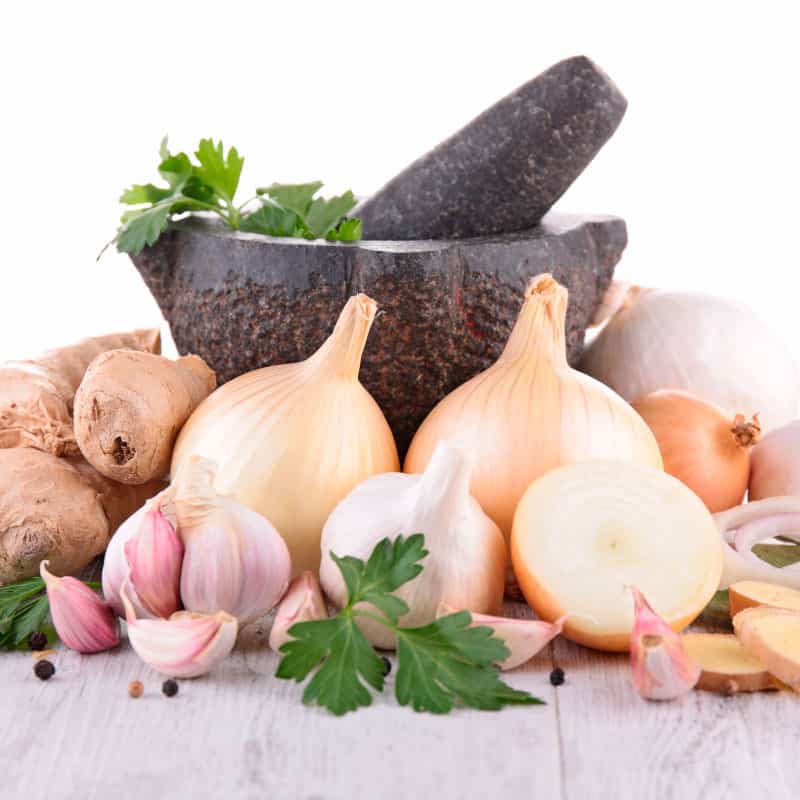This Dr. Axe content is medically reviewed or fact checked to ensure factually accurate information.
With strict editorial sourcing guidelines, we only link to academic research institutions, reputable media sites and, when research is available, medically peer-reviewed studies. Note that the numbers in parentheses (1, 2, etc.) are clickable links to these studies.
The information in our articles is NOT intended to replace a one-on-one relationship with a qualified health care professional and is not intended as medical advice.
This article is based on scientific evidence, written by experts and fact checked by our trained editorial staff. Note that the numbers in parentheses (1, 2, etc.) are clickable links to medically peer-reviewed studies.
Our team includes licensed nutritionists and dietitians, certified health education specialists, as well as certified strength and conditioning specialists, personal trainers and corrective exercise specialists. Our team aims to be not only thorough with its research, but also objective and unbiased.
The information in our articles is NOT intended to replace a one-on-one relationship with a qualified health care professional and is not intended as medical advice.
16 Soothing Strep Throat Home Remedies
February 5, 2017

Strep throat can be a painful and frustrating respiratory condition, making it hard to swallow, eat and sleep. Although the conventional treatment for strep throat is antibiotics, research shows that they only reduce the length of the illness by about half a day. They also don’t seem to affect time off from school or work. Because antibiotic-resistant bacteria is becoming a real threat, it’s helpful to try strep throat home remedies first. It’s also important to avoid close contact with others until your strep throat symptoms are gone; this way you won’t spread the bacteria and reinfect yourself.
Strep Throat vs. Sore Throat
Sore throats are pain in the throat that is typically caused by a virus. It can be due to bacteria, allergies, pollution or throat dryness. Strep throat is an infection of the throat caused by bacteria. Sore throat is a symptom of strep throat and it’s also a symptom of other respiratory conditions. Both are contagious; they can be passed from person to person in any place with close contact.
Not many people with sore throats have bacterial infections. According to the Institute for Clinical Systems Improvement, viruses cause 85 to 95 percent of throat infections in adults and children younger than 5 years of age. Viruses cause about 70 percent of throat infections in those aged 5 to 15 years, with the other 30 percent due to bacterial infections, mostly group A strep. Natural sore throat remedies should be your first choice, as antibiotic treatment will not help a viral infection. (1)
It can be hard to tell the difference between strep throat symptoms and symptoms of a viral infection. Remember, while trying to make a self-diagnosis, that strep throat doesn’t include cold symptoms, like coughing, sneezing or runny nose. If you have a sore throat with cold symptoms, it’s likely caused by a viral infection and it’s not strep throat. (2) Try strep throat home remedies to find some relief from your symptoms.
Causes & Symptoms of Strep Throat
Strep throat is an infection of the throat and tonsils. It’s caused by group A Streptococcus bacteria, also called group A strep. The group A strep bacteria is very contagious. It spreads through contact after an infected person coughs, sneezes, touches your mouth, nose or eyes. The bacteria also spreads by sharing a glass, utensil, plate or even a doorknob. This is why strep throat seems to happen more often in the colder months when people tend to be in closer quarters.
Strep throat symptoms typically start within five days of exposure to the strep bacteria; symptoms include (3) :
- Sore throat and difficulty swallowing
- Red and swollen tonsils
- Red spots on the roof of the mouth and a white or yellow coating on the throat and tonsils
- Swollen lymph nodes
- Fever of 101 degrees Fahrenheit or above
- Headache and body aches
- Non-itching, red rash, which is a sign of scarlet fever. Scarlet fever is a serious bacterial infection.
Conventional Strep Throat Treatment
The most common strep throat treatment is antibiotics, such as penicillin or amoxicillin. Research suggests that just mentioning a sore throat to a doctor almost guarantees a prescription for antibiotics, even though viral infections cause 85 to 90 percent of sore throats in adults.
Studies show that antibiotics are only somewhat helpful when used for strep throat. They can improve symptoms at 3 to 4 days and cut the length of the illness by about half a day. Antibiotic treatment doesn’t seem to affect time off from school or work. (4)
Over-the-counter pain medications, such as acetaminophen and ibuprofen are also used to relieve the pain related to strep throat.

16 Strep Throat Home Remedies
Supplements:
1. Elderberry
Elderberry has antibacterial and antiviral effects. A recent study showed that elderberry can protect against respiratory symptoms during long flights. Researchers analyzed this due to the increased risk of getting upper respiratory disorders and virus and bacteria-induced respiratory infections on flights. They found that the travelers returning from overseas, who used elderberry, showed fewer respiratory symptoms than the placebo group. (5)
You can drink elderberry tea, take capsules, or use elderberry powder. You can even buy it in liquid form.
2. Echinacea
Known as another way to prevent the common cold, researchers suggest that there are many powerful echinacea benefits, including its ability to work as an immuno-enhancing herb that can stop the spread of bacterial conditions like strep throat. There is good evidence suggesting that the phytochemicals in echinacea, and one of its compounds called echinacein, can keep bacteria and viruses from entering healthy cells. (6)
Echinacea can also be used to relieve pain related to strep throat, such as sore throat, headaches and body aches. It has anti-inflammatory effects that will help to reduce swelling in the throat and tonsils. Take echinacea in liquid form, as a tea or in capsule form as soon as symptoms appear.
3. Vitamin C
Use vitamin C to boost your immune system, repair tissue damage in the throat and decrease your risk of a wide range of illnesses. Take 1,000 milligrams of vitamin C to fight off an oncoming infection. Take 4,000 milligrams per day to get rid of an infection already in your system. (7) If you have strep throat and need to boost your vitamin C consumption, take a supplement and eat vitamin C foods like oranges, kale, strawberries, grapefruit and kiwi. If you are having trouble swallowing, try making a smoothie.
4. Vitamin D
Researchers have studied the link between vitamin D deficiency and respiratory infections for years. Scientific evidence shows the important role vitamin D plays in the immune system because of its antimicrobial defenses. A recent study published in the International Journal of Infectious Diseases shows that there’s a link between vitamin D deficiency and the recurrence of respiratory conditions caused by group A strep bacteria. (8)
What to Eat and Drink:
5. Raw Honey
A daily dose of raw honey raises levels of health-promoting antioxidants in the body. This helps to boost the immune system and is one of several soothing strep throat home remedies. According to research published in the Asian Pacific Journal of Tropical Biomedicine, honey’s healing property is due to its antibacterial activity, ability to maintain a moist wound condition and its thick consistency that helps to create a protective barrier to prevent infection. Studies have found that medical grade honeys have strong bactericidal activity to fight antibiotic-resistant bacteria that cause several life-threatening infections in humans. (9)
6. Bone Broth
Bone broth helps to keep you hydrated and it provides minerals that you need to boost your immune system. It’s soothing and easy to eat when you are suffering from a sore throat or swollen tonsils due to strep throat. Bone broth contains minerals in forms that your body can easily absorb, including calcium, magnesium, phosphorus, silicon and sulphur. It also contains chondroitin sulfate and glucosamine, the compounds sold as pricey supplements to reduce swelling and joint pain. (10)
Instead of spending hours making bone broth from scratch, use protein powder made from bone broth to help you recover from strep throat quickly. Drink warm bone broth throughout the day.
7. Herbal Tea
Drink herbal tea to soothe your throat, ease pain and treat inflammation of the mucous membranes. Chamomile tea is a great choice because the plant is loaded with antioxidants that help reduce pain, congestion, swelling and redness. (11) Dandelion tea is another one of the strep throat home remedies because it is used to treat infections, ease an upset stomach and boost your immune system.
8. Apple Cider Vinegar
Sipping apple cider vinegar is an easy way to treat strep throat naturally. Apple cider vinegar has powerful healing compounds such as acetic acid, which can kill dangerous bacteria while helping the growth of beneficial bacteria. Because acetic acid kills unwanted bacteria when it comes into contact with it, this natural compound practically acts as a natural antibiotic. (12)
What to Do:
9. Gargle with Himalayan Salt
Gargling with pink Himalayan salt water helps to reduce swelling, soothes a sore throat and creates an unpleasant environment for bacteria in your mouth. Salt temporarily increases the pH balance of your mouth, creating an alkaline environment that makes it hard for bacteria to survive. Himalayan salt is known to improve respiratory conditions because it’s an antibacterial agent. It has anti-inflammatory properties and it removes pathogens from the mouth when gargled or swallowed. (13)
10. Try Oil Pulling
Research shows that oil pulling has the power to reduce the presence of strep bacteria in the mouth. Use it as a tool to maintain oral health. (14)
Coconut oil pulling is one of the best ways to remove bacteria from the mouth. It works as an oral detox, sucking up the toxins in your mouth and creating a clean, germ-free environment. To use oil pulling as one of your strep throat home remedies, swish 1 to 2 tablespoons of coconut oil in your mouth for at least ten minutes. Then spit out the oil in the trash, rinse your mouth and brush your teeth.
Essential Oils:
11. Peppermint Oil
Peppermint oil is a great essential oil for a sore throat. It reduces swelling in the throat, which is why it’s often used for the treatment of respiratory infections. Because peppermint oil contains menthol, it causes a cooling sensation and a calming effect on the body. (15)
Add 1-2 drops of peppermint oil to a glass or water or to your toothpaste to use it internally. For topical use, apply 1-2 drops to your throat, chest and temples.
12. Lemon Oil
Lemon oil has antibacterial properties and it helps to cleanse toxins from the body. Research shows that lemon oil is able to limit the growth of antibiotic-resistant bacterial strains. (16) To use lemon essential oil, add 1-2 drops to a glass of cool or warm water, or add it to herbal tea for more flavor.
13. Thyme Oil
Thyme oil supports the immune and respiratory systems, making it one of the strep throat home remedies. A 2011 study published in Medicinal Chemistry tested thyme oil’s response to 120 strains of bacteria taken from patients with infections of oral cavity, respiratory and genitourinary tracts. Results showed strong activity against all clinical strains. It also showed effectiveness to resist antibiotic resistant strains. (17)
You can use thyme oil as a mouthwash by adding 2 drops to water and gargling. Or take a bath with 2 drops of thyme oil added to ease body aches.
To Prevent Spreading the Infection:
14. Avoid Contact
As long as you have strep throat symptoms, don’t sneeze or cough on others in order to stop the bacteria from spreading. Do not share glasses, utensils, plates or food with anyone for two weeks. Use a powerful and natural soap, like castile soap, to wash your dishes and the surfaces in your bathroom and kitchen counter.
15. Wash Your Hands
Be sure to wash your hands throughout the day, especially if you are around other people. Use an antibacterial soap to get rid of any trace of group A strep. One example is this Homemade Hand Soap with castile soap and peppermint oil.
16. Replace Your Toothbrush
Replace your toothbrush when you first show symptoms of strep throat and then again after you are well. This will help you to avoid reinfecting yourself with another group A strep infection.
Precautions
Get a lab test before you decide to use antibiotics, as they will not help against viral sore throats. Viruses such as influenza and adenovirus cause most sore throats. Also, strep throat symptoms and symptoms of non-strep sore throat are a lot alike.
You should see your doctor if you have trouble swallowing, your throat is blocked by swollen tonsils, or your fever doesn’t go down. Antibiotic treatment should only be used for illnesses that it can treat best; overuse can contribute to the rise of antibiotic-resistant bacteria. However, if you are still sick after nine days of using these home remedies for strep throat, see your doctor about further treatment.
Final Thoughts
- Strep throat is a bacterial infection of the throat and tonsils caused by the group A strep bacteria. It is highly contagious and spreads through close contact.
- Strep throat may lead to scarlet fever, a very serious bacterial infection.
- The conventional treatment for strep throat is antibiotics. Antibiotics will cut the length of the illness by about half a day.
- Strep throat home remedies include supplements that will boost the immune system, foods that will soothe the throat and ease pain, and essential oils that help to kill bacteria.









